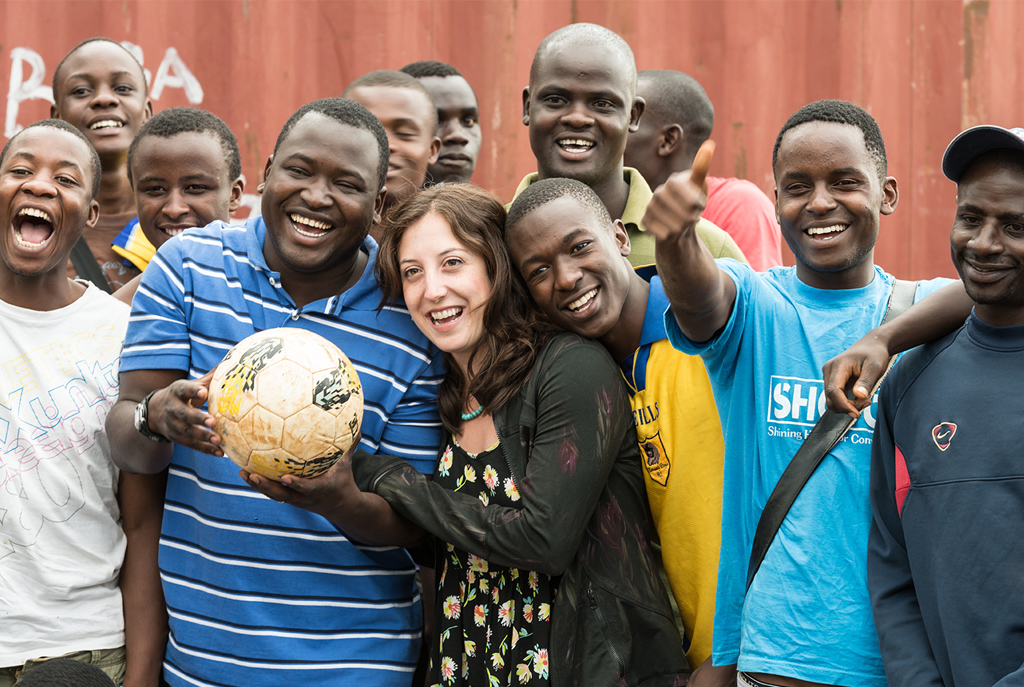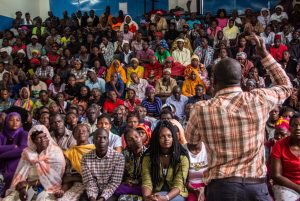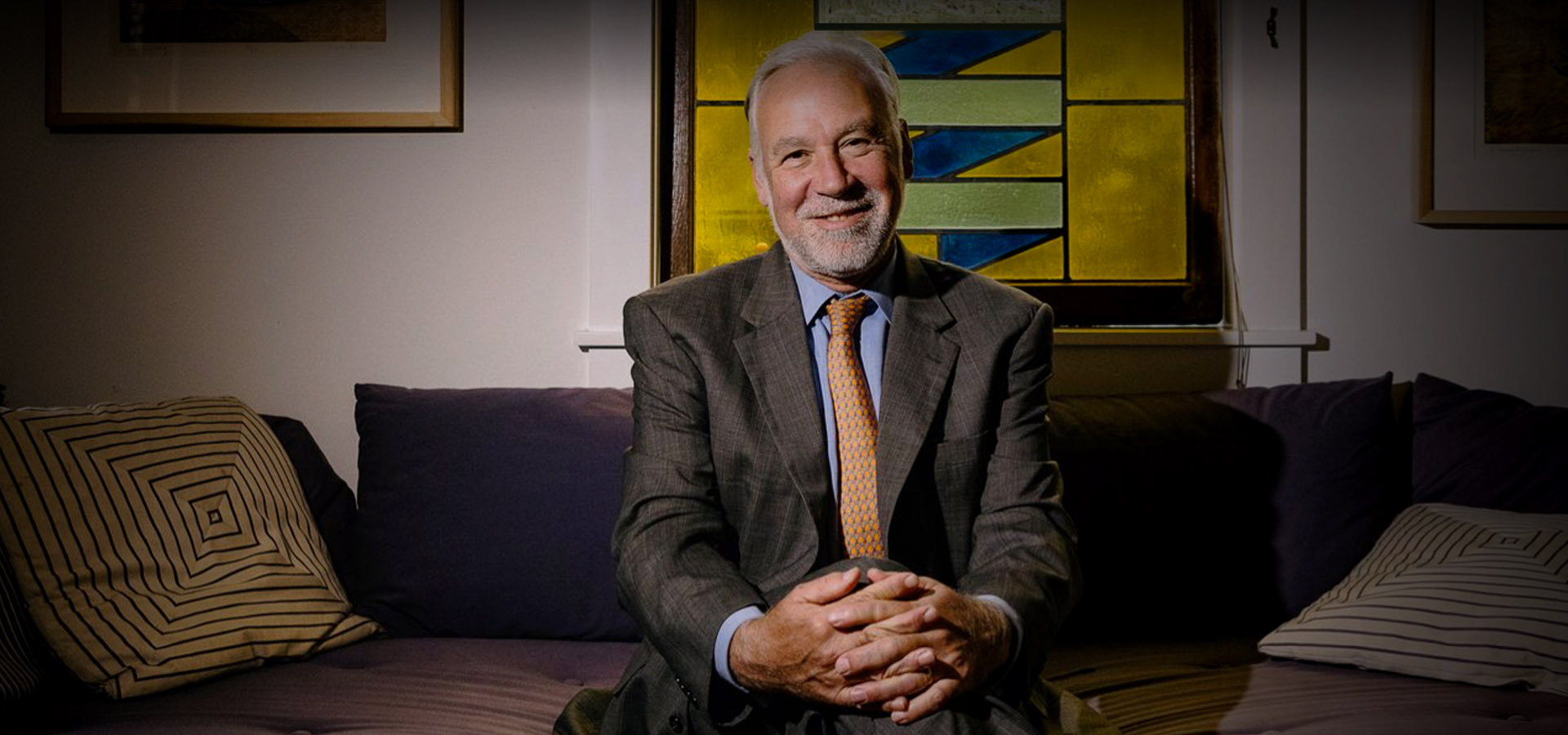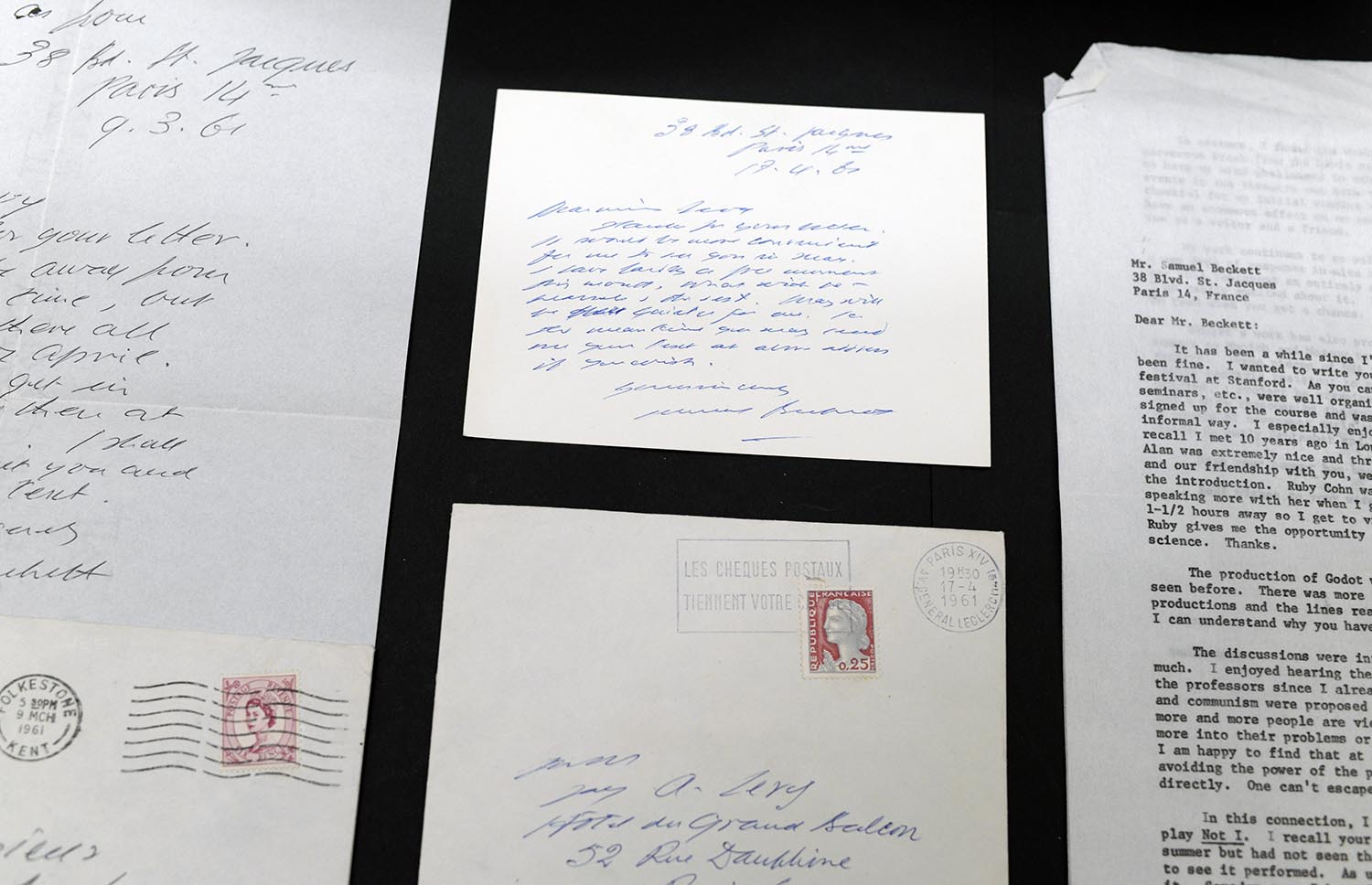Light By Which to Dream

[Photo by Audrey Hall]
Growing up living hand-to-mouth in a Nairobi slum, Kennedy Odede ’12 experienced true hardship and despair firsthand. But after a serendipitous encounter with Jessica Posner ’09, the couple made it their life’s work to bring hope to those who need it most.
Kennedy Odede ’12 started a movement with a soccer ball and 20 cents. His ultimate goal of improving horrendous living conditions for thousands of people was crazy or inspired (or both). His rise from an impoverished and danger-filled existence in a vast and oppressive slum, Kibera in Nairobi, was unlikely and wouldn’t have happened without a dream-foretold meeting with Jessica Posner ’09.
From those long odds came Odede and Posner’s inspiring story, which they relate in The New York Times best seller Find Me Unafraid: Love, Loss, and Hope in an African Slum. It has ignited the enthusiasm and support of admirers worldwide, and prompted a thundering standing ovation when Odede came to campus to share it with Wesleyan first-year students this August. Their organization—SHOFCO, Shining Hope for Communities—has made a deep impact on the lives of the poorest of the poor, won support from a long list of contributors like the Newman’s Own Foundation, put Odede on stage in Davos and other high-profile venues, elicited commentary from influential individuals such as New York Times columnist Nicholas Kristof, and prompted a shower of awards and accolades, including the 2018 Conrad N. Hilton Humanitarian Prize—at $2 million, the world’s largest annual humanitarian award.
“Kennedy has shown me how capable humans are of inciting change,” wrote Emma Adelstein ’23, one of many written responses to the book from first-year students. “As clichéd as it may sound, by bringing hope to his community, Kennedy showed me how possible it is for all of us (the class of 2023) to give hope to our communities.”
Refusing to Give Up Hope
First and foremost, SHOFCO’s success is a tale about a young man who refused to give up hope—even when he arrived home one evening from a day of hard, ill-paid labor to find his good friend Calvin had hanged himself in despair; even when he himself was beaten nearly to death after he stole a mango at a market to assuage painful hunger. It’s a story about Jessica, who bravely inserted herself into Kennedy’s world against all advice and despite serious risks to her well-being. But it’s also a Wesleyan story—about a university that, at Jessica’s urging, opened its doors to an interesting community organizer who lacked any semblance of standard qualifications for admission.
Kennedy’s story defies easy explanation. He was born to an unwed mother, a fact that robbed him of any miniscule social standing he might have had in a slum estimated to hold nearly a million people lacking potable water, basic sanitation, and access to rudimentary education. He routinely went for days with little or no food.
His near-death experience when he was a child points to a saving grace in his life. It occurred two days after his stepfather, who abused alcohol and had a history of violence, had threatened his mother with a machete. In the chaos that followed, Kennedy went for two days without eating before he and a friend ventured into a middle-class neighborhood called Lang’ata Otiende to search for scraps of food in the garbage, with no luck. So, while his friend distracted a woman at a stall selling mangoes, Kennedy grabbed one. The woman saw him and shouted, “Thief!” Kennedy had seen mob violence in action, such as people burned to death for stealing insignificant things. He had no illusions about his fate when bystanders began beating and kicking him. Miraculously, a man pushed his way through the crowd and demanded that they stop, offering to pay for the mango. He helped Kennedy, bleeding and in pain from damaged ribs, to get away from the market and asked why he had stolen the mango. Kennedy explained his desperate hunger. Then this good Samaritan, who identified himself only as “a man of God,” gave Kennedy enough money to feed his family for a week. It would not be the last time that a kind person intervened at a critical moment in Kennedy’s life.
That brush with death, however, was not the beginning of Kennedy’s salvation. At age 10, unable to bear more of his stepfather’s vicious attacks, he ran away from home and found his way to a street gang. Stealing parts from fancy cars and sniffing petroleum for a high became part of his daily life. Not until he watched his best friend in the gang beaten to death by a crowd who caught the boy stealing did Kennedy start to look for other, legal ways to earn what was still well shy of a living. Before long he met a priest, and through the church he found hope in the form of food and an invitation to study at a school. He read Martin Luther King Jr. and Nelson Mandela. He returned to the story of Moses, a source of inspiration for him.
“I, too, wanted to lead my people into a new land of promise, but I didn’t know how,” he wrote in Find Me Unafraid. “I didn’t dare dream. There was no light by which to dream.”
Another sliver of light came one day when Kennedy was returning, exhausted, from work in a maize factory. He met a boy selling a soccer ball and decided he had to buy it with his last 20 cents. He thought that if he could get a group of men and women together to play soccer, that would be a start at forming a community. Soon he had a group dedicated to raising money and starting small businesses, as well as a youth group focused on reading inspirational Bible passages. Next came the name. Kennedy suggested Shining Hope for Communities. He got pushback: too much English! Kennedy was adamant. The name conjured a vision for him, but he did consent to an abbreviation: SHOFCO.
A Natural Leader
Africa is awash in NGOs (non-governmental organizations). From the outset, Kennedy was certain that he did not want to create another one. He wanted a genuine movement fashioned by people in Kibera who had been made invisible by their poverty. Most emphatically, he did not want foreigners playing a guiding role.
It’s easy to see Kennedy as a natural leader. With a loud, infectious laugh and a ready smile, he exudes warmth. He is articulate and speaks forcefully and confidently in his strong Kenyan accent. Unpretentious, he’s quick to give credit to many in the Wesleyan community and beyond for the success of SHOFCO. He’s piercingly intelligent, absorbs information quickly, and reads people with the skill of someone whose survival in Kibera depended upon astutely assessing individuals and their motives on the spot. He credits his mother, who always encouraged the notion that he could be a leader, as a source of his inspiration.

Gifted and capable, he’s also lucky. Luck was with him when he received an email from an American woman named Jessica, who wanted to volunteer with SHOFCO and organize a street theater program. He asked Jessica to send her resumé and then brought it to SHOFCO leadership. They agreed that Jessica could come as long as she had no role in management or decision-making. Not long after, he had a dream that a white woman was standing on a corner in Kibera wearing a dress with red roses on it. He heard a voice saying, “Kennedy, this is your partner.” He dismissed it. There was no way he was going to have a white woman as a partner.
Jessica arrived in Nairobi and almost immediately presented Kennedy with a problem. She believed strongly that the only way she could form a bond with Kibera’s young girls was to live in Kibera. There were no guest quarters of any kind. Kennedy pointed out that no white person had ever lived in Kibera more than briefly. Jessica, however, simply would not take “no” for an answer.
Kennedy finally agreed that she could live with him as a friend in his cramped one-room shack with access to a pit latrine. He had one question for her, Jessica wrote: “Do you tell your parents that you email strange African men living in slums, whom you’ve never met, and ask to move in with them?” They both burst into laughter.
As the dream foretold, they fell in love and eventually married, though not easily nor without conflict.
He was never luckier than one night when tribal violence broke out all over Nairobi following a disputed presidential election (Jessica was back in the United States). Kennedy’s life was at risk in the chaos that followed and he narrowly escaped, once again with Jessica’s help.
Once in Dar es Salaam, Tanzania, Kennedy was in limbo. He could not return to Kenya. Aside from the tribal fighting, Kennedy had gained attention as a community leader and now, as a prominent Luo, was marked for death. One day, he eagerly opened an email from Jessica hoping for a note filled with love. Instead, she sent him applications to several universities with one word in the subject line: APPLY. His family had no money; he had no high school degree, no SAT scores, and barely any semblance of formal education.
With Kennedy unable to return to his homeland and initial admission deadlines already having passed, Jessica urgently appealed to Wesleyan’s administrators. No one, she argued, had more to offer the campus community than Kennedy thanks to his profound life experiences. Unbeknownst to Jessica, Kennedy had separately reached out to President Michael S. Roth ’78. Despite some initial reservations and Kennedy’s lack of traditional credentials, Wesleyan was won over by Kennedy’s unique candidacy and offered him a full, all-expenses-paid scholarship.
Kennedy laughs at himself as he recalls his first days at Wesleyan, running toward the dining hall to beat the crowd before food ran out until friends reassured him that food would be plentiful (and bewildered over a plastic card that could hold cash). But he could take a shower and he was safe. Nearly overwhelmed by the luxuries of Western life, he was acutely conscious of the unbridgeable gap between his old existence and his new one, and of the plight of those he had left behind.
His first-year advisor was Rob Rosenthal, professor of sociology (and current interim provost), who had been a foreign exchange student in high school and knew how disorienting immersion in another culture could be.
“We met every Friday,” Rosenthal says. “Kennedy would store up all the weird things that had happened during the week and ask, ‘What does this mean?’ I was struck by his openness and his desire to understand things right away.”
His formal education and knowledge of cultural references was very thin; he’d had no access to media. He once came in confused about a giant wall that had fallen in New York, not realizing that Wall Street was a cultural reference for the world of finance.
“Coming to Wesleyan,” says Kennedy, “for the first time I went to a place where you are who you are. You are accepted. And for me, that built confidence. I wanted to be like everybody else, but everyone told me, ‘Kennedy, you have no idea. These students here, they just respect you even more if they know your background.’ And I found a family here.
“I really learned writing. Wesleyan is the best place to learn how to write [amply demonstrated when he had an op-ed published in The New York Times while he was an undergraduate]. I learned to put things in order; I learned critical thinking. Right now, I’m educated. I went to Wesleyan. And people respect that. It’s given me a kind of bravery.”
Use Your Privilege for Good
The summer after his first year, Kennedy went back to Kibera—a decision that Rosenthal found “mind boggling” because his safety was still far from assured. During the year, Kennedy had wrestled with feelings of guilt over the enormous privilege he had been granted by coming to Wesleyan. He was weighed down by the thought that he simply could not fail. Failure, in his view, would diminish Wesleyan’s willingness to take a chance on students like him.
Out of that personal struggle, he developed an attitude toward privilege: whether you are rich or poor, you are privileged to be at Wesleyan. What really counts, he argues, is what you do with your privilege. He placed a contentious issue in the context of hope and social responsibility.
“His message is freeing to students,” Rosenthal says. “It allows them to avoid being paralyzed over privilege, and move on to consider what to do with it.”
For one student, learning about SHOFCO brought back vivid memories. Tatiana Meyer ’23 says her family moved to Kenya when she was in seventh grade.
“I ate chipati, drove beside the matatus (private minibuses) that blew red dust into the air, and even volunteered at a school in Kibera,” she says. “However, while I lived just 15 minutes away from where Kennedy was, I inhabited a different world—one in which I was on the outside looking in. My house was situated in a leafy, gated community. I had to pass through three security entrances to get home, and my house had walls topped with barbed wire and a guard. When I left the house, I was driven by a Kenyan driver called Sam in a big black car with bulletproof glass.”
Reading the book enabled her to see anew what had been right in front of her eyes but difficult to understand from her sheltered and youthful perspective. “Our common humanity,” she says, “is shared through stories.”
One day, Jessica dragged Kennedy to the Usdan University Center to see a poster: 100 Projects for Peace, $10,000 grants, funded by the Kathryn Wasserman Davis Foundation. Kennedy had dreamed of building a school for girls in Kibera, but he was skeptical about their prospects for obtaining the grant. Jessica refused to be deterred and drafted their application. They got the grant and headed to Nairobi to build the school during the summer—in six weeks. The timetable was nearly impossible, especially in Kenya, but no one told them it couldn’t be done.
SHOFCO’s rise seemed to defy the normal laws governing nonprofit growth. In short order, Jessica and Kennedy secured support from the Echoing Green Foundation and Newman’s Own Foundation. They opened a clinic named for Johanna Justin Jinich ’10, who dreamed of working for women’s public health but was tragically murdered as an undergraduate. Kennedy was invited to sit beside President Bill Clinton and actor Sean Penn at a Clinton Global Initiative event. Jessica was the grand prize winner of the 2010 VH1 Do Something! Awards. Kennedy was the grand prize winner of the 2010 Dell Social Innovation Competition. Many honors have followed those.
Fatefully, Wesleyan brought together Kennedy and Robert Patricelli ’61, P’88, ’90 (whom Kennedy called his “American dad”). Patricelli and his wife, Margaret, had funded the scholarship that paid for Kennedy to attend Wesleyan, and in the fall of Kennedy’s first year, Patricelli joined him for lunch on campus.
“I remember telling my wife afterwards that I just met one of the ten most remarkable people I’ll meet in my lifetime,” he says.
“He is enormously capable of having inspiration and giving inspiration,” Patricelli adds. “He had the insight that the quality of hope was missing in his community. Margaret and I were swept up by him and Jess. Theirs is a partnership of love and endeavor.” Over the years the Patricellis have made multiple trips to Kibera. The couple endowed the Patricelli Center for Social Entrepreneurship on campus, reasoning that Wesleyan could incubate more Kennedys and do more to encourage and prepare young people determined to have a meaningful impact on the lives of others. The Center hosts numerous educational programs and sponsors an annual competition to award grants for the best social entrepreneurship proposals. Wesleyan is now seen as one of the top schools in the country for encouraging students to develop their capacity for social impact.
Power Is With the People
Today, SHOFCO runs schools recognized as some of the best in Kenya. It is active in nine Kenyan slums, and provides services to over 350,000 people, including access to clean water, health care, entrepreneurship programs, gender violence support, and community organizing platforms that seek to enact systemic change. Kennedy serves as the CEO and a worldwide ambassador for SHOFCO. Jessica remains closely involved and on the board; she recently became chief executive officer of Girl Effect, a nonprofit originally founded by the Nike Foundation that works globally with adolescent girls to give them voice and agency to make choices in their life. Jessica says, “I am so humbled to become the CEO of Girl Effect, as I am taking the lessons of the power and opportunity of every girl I have worked with via SHOFCO and applying these lessons globally.”
One of SHOFCO’s major initiatives in the past few years was the founding of SHOFCO Urban Networks (SUN), intended to organize community councils in slums throughout Kenya in order to establish local priorities and promote nonpartisan political engagement. The intent is to encourage the Kenyan government to provide essential services, a dramatic shift for a government that in the past has provided neither services nor any kind of recognition for Kibera and other slums. The SUN initiative is now active in 11 communities in all three of Kenya’s major cities. Kennedy credits the government with recognizing the need to respond to organized groups of people who until now had no voice.
“He has reinvented that power is with the people,” says Patricelli.
Kennedy spoke at Wesleyan’s 2012 Commencement ceremony, telling his improbable story. “Shining Hope for Communities grew,” he said, “because the entire Wesleyan community embraced it.” That embrace hasn’t diminished. As Ella Biehn ’23 wrote:
“The book reminds me of many important things I hope to carry with me through my time in college—that the world is diverse yet interconnected, that change is painful yet possible, and that people can be just as kind as they are cruel. Most importantly, I am reminded that this earth is besieged by tragedy, but it is also filled with hope.”
Kennedy and Jessica today have 15-month-old twins—Oscar and Maridad— and a third baby on the way. They live a life filled with hope and the love of kind people. It’s a story Kennedy knows well.



